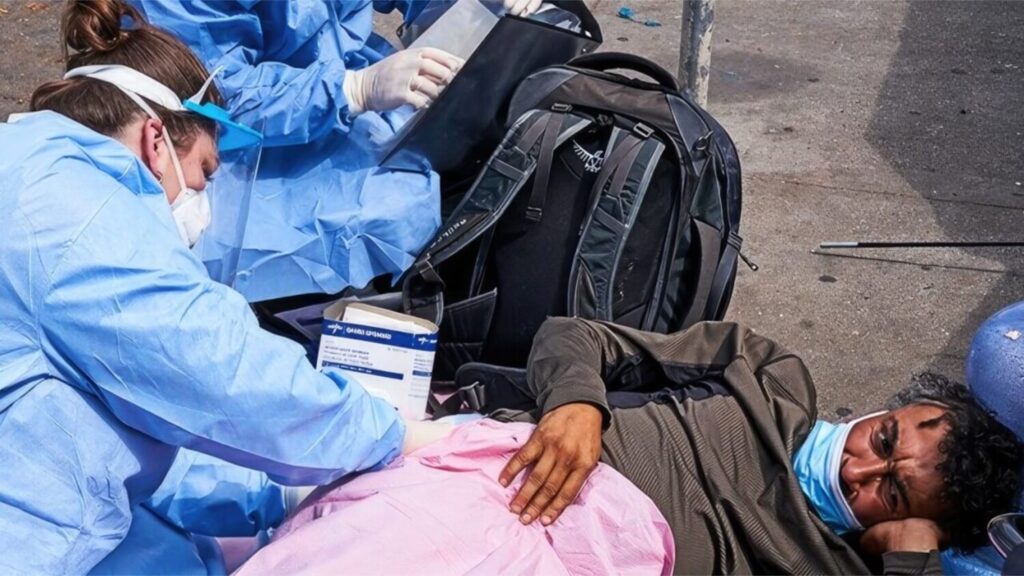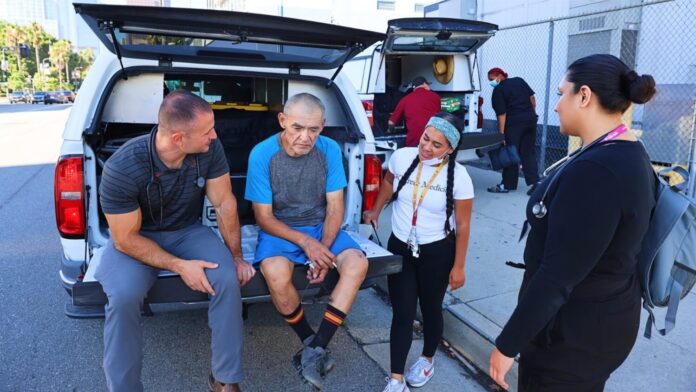In 2018, USC Street Medicine Founders Brett Feldman and Dr. Jehni Robinson took on one of LA’s greatest obstacles: healthcare for its unsheltered homeless population. The USC Street Medicine Team provides point of care health services that meets homeless patients wherever they are. The program combines medical expertise, social service outreach, and cutting-edge research to address the unique challenges faced by the unhoused community in Los Angeles, according to their website.
Before treating homeless individuals throughout LA, Feldman and Robinson concentrated their efforts inside LA General Medical Center. Robinson said the program consulted with unhoused, hospitalized patients with three goals in mind: preventing a return to the street from the hospital if possible, developing a plan of care that took their lived reality into account and fostering a trusting relationship with their patients in order to reconnect once they were discharged.
“We started with the sickest of the sick,” said Robinson. “We were able to actually find 70 percent of the patients that we initially saw in the hospital on the street.”
According to Feldman, the nature of homelessness in LA differs from other cities in the US. The time it takes to complete a homeless census in LA is three-fold to comparable cities in the US, estimating around 50,000 homeless individuals in a single night. According to a New York Times article published in April 2023, LA County averages five homeless deaths per day.
“[Homelessness in LA] looked a lot like it did in much less developed countries to be honest,” said Feldman.
Citizens of LA voted to approve Measure H in July 2017, which is a quarter of a cent sales tax towards addressing and preventing homelessness. According to the County of LA Homeless Initiative, this special revenue fund is projected to accrue $355 million annually for 10 years. Feldman said Measure H demonstrated that solving the homeless crisis was important to LA citizens, which encouraged him to move from Pennsylvania where he was the director of street medicine at Lehigh Valley Hospital.
“I was also blown away by the people working in LA’s desire to solve the crisis,” said Feldman. “They were willing to pay out of their own money.”
Anne “Jack” Hinton, a Physician Assistant on the USC Street Team, said that homeless patients often have a unique set of challenges, including chronic ailments like ulcers and venous inefficiencies from living and sleeping on the streets. Treatments range from primary care to treat hypertension, diabetes and high cholesterol to sexually transmitted infections and wound care.
Hinton said patients not being able to keep their feet up at night and not having access to a shower causes many of these treatments to have only short-term success and not fully improve their condition.
“For the most part, we try to follow up with people and tend to their general health,” said Hinton.
However, before they can treat their patients, trust must be established, said Hinton. She said it is vital to treat her patients as peers and to constantly keep their emotional state in mind. According to Hinton, many have suffered from traumatic experiences within the traditional healthcare systems, which makes them wary of the street medicine teams.
“I think a lot of people are afraid to go to hospitals for [fear of] being othered and being discriminated against right away,” Hinton said.

According to a cross-sectional study of adults with cardiovascular conditions, homeless adults were significantly more likely to experience surgical complications and be hospitalized for cardiac arrest or stroke. Feldman said this study accurately reflects the experiences of unhoused patients within hospitals, and his work is dedicated to bringing primary care provider (PCP) levels of care wherever his patients are.
“Street medicine is an act of reconciliation to say that we’re sorry for the way that they’ve been treated,” said Feldman.
Similarly, Robinson said hospitalized unhoused patients tend to feel alone and scared and that these feelings can be exacerbated if the patient experiences withdrawal symptoms.
“I’ve certainly heard patients describe it as feeling like all of these things were being done to them,” said Robinson. “[They felt they were] being poked and prodded and not understanding why it [was] being done.”
Feldman said the patient-centered care that the program provides relies upon both building mutual trust between patient and provider, and having the financial stability to bring the care directly to the homeless community.
Feldman said that in the past, insurance providers would only reimburse if patients visited their PCP. However, to see their PCP, patients risk their belongings being stolen and generally have more pressing needs like securing food and a safe place to rest. Oct. 1, 2023, the Center for Medicaid and Medicare added a new place of service code to allow for the reimbursement of street medicine care.
“I think in that way the system is just as much our patient as our patients are,” said Feldman. “I personally would not give up everything I own to attend a doctor’s appointment.”
Feldman said that healthcare, in particular insurance, is moving towards a future in which street medicine is the norm for providing service for unsheltered homeless individuals. Furthermore, according to Feldman, 30 to 40 percent of their patients eventually receive housing, and effective healthcare prepares individuals to receive their new housing in stride and to have a successful outcome. Feldman said that in 2017, there were only six street medicine programs in California, and now he knows of 58 programs across the state.
As medicine is becoming increasingly available to those living on the street, it illuminates the importance of establishing trust and building relationships with unhoused patients, said Feldman. According to Feldman, he has been encouraged to not share personal stories with his patients. However, Feldman said trust forms through bidirectional relationships.
“I have to give some of myself to them,” Feldman said.
Contact Adam Cole at acole2@oxy.edu.
This article was updated March 25 at 10:50 a.m. to reflect that there were six street medicine programs in California in 2017, not eight in 2007.
![]()




































